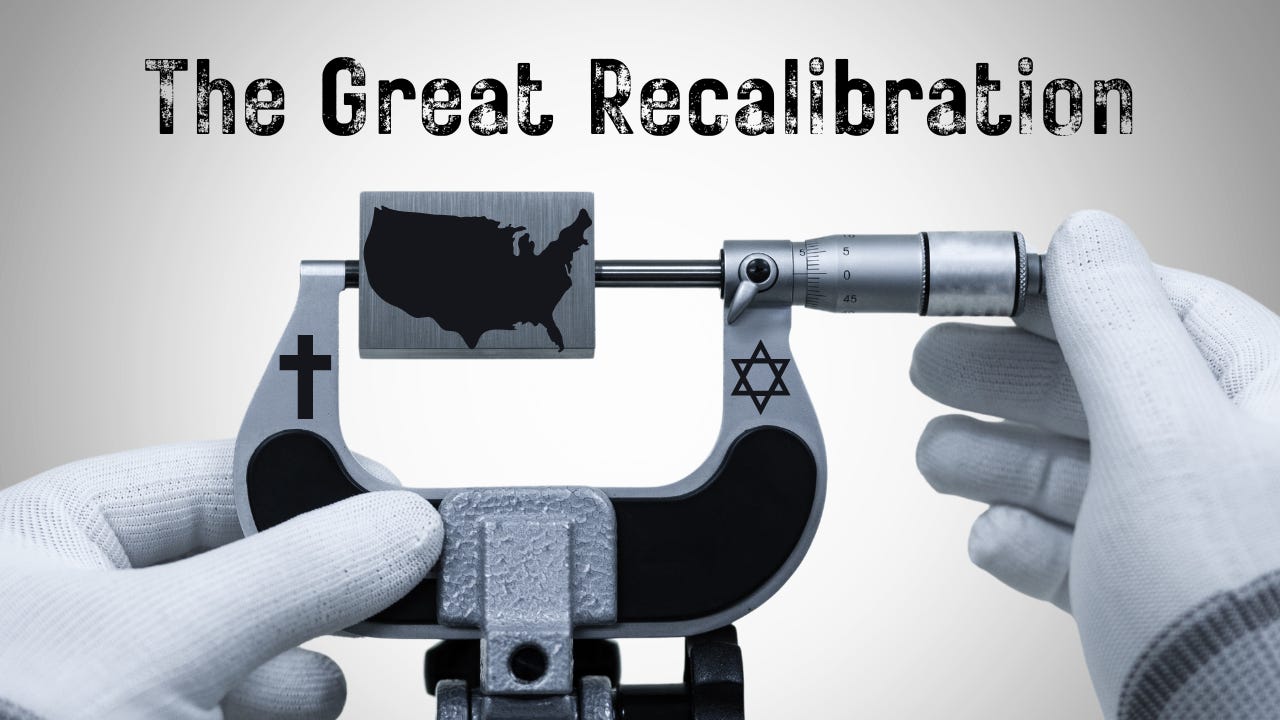The Great Recalibration
The Return of the Judeo-Christian West marks the End of the Liberal Planet
While the world outside the Atlantic Bloc fractures into multipolar alignments, something equally profound is happening inside. The liberal-globalist era that defined Western identity for three decades is ending—not with repudiation, but with replacement. The values that once underpinned the unipolar order—diversity-as-virtue, institutional humanism, borderless progressivism—are being swapped for something older, harder, and more civilizational. This is not a cultural revival. It is a strategic recalibration of Western identity in service of Realist imperatives.
The old ideological scaffolding is no longer useful. In its place emerges a reasserted Judeo-Christian civilizational narrative, promoted not just as heritage, but as geopolitical operating system. This shift is not organic; it is top-down, tactical, and adaptive. As multipolarity takes root, Western power centers are preparing for long-term existential rivalry—not just with peer competitors like China, but with the entire civilizational alignment rising to support its dominance across Eurasia.
The cornerstone of this transformation is the U.S.-Israel alliance. Once framed as a strategic partnership, it is now fast becoming an identity merger. The United States and Israel are no longer just allies—they are civilizational co-anchors in a world unraveling from global liberalism. The conflict between Israel and Hamas in Gaza, while humanitarian in its cost, cannot be understood outside its proxy context: it is a node in a larger struggle, pitting the Western Judeo-Christian bloc against the Arab-Muslim alignment led by Iran, backed by regional militias and transnational ideological support. Israel, for some, may appear as a proxy of the U.S., while others argue the inverse. In reality, they are increasingly inseparable in both strategic and identity terms.
This framing requires clarity: not all Palestinians are hostile to Israel. Many are caught under the governance of radical factions such as Hamas, which function as geopolitical instruments of anti-Israel blocs. In this sense, the people of Gaza mirror the tragedy of the Ukrainian population after 2014—trapped between civilizational forces, ruled by externally backed actors, and instrumentalized in proxy warfare. These conflicts are not simply bilateral. They are multipolar entanglements.
Domestically, the United States is adapting. The globalist project has lost public legitimacy. What rises in its place is not a revival of classical liberalism, but a hardened form of Realist nationalism. Populist sentiment, once dismissed as reactionary, is now being harnessed by the state to justify military buildup, economic protectionism, and renewed hemispheric assertiveness. China is the external threat, but the internal narrative has shifted as well. American elites have begun to realize that survival now requires rallying, not dissolving, the core.
This new domestic posture is to be administered by what can be called the managerial class—a stratum of bureaucrats, corporate executives, technocrats, academics, and media gatekeepers who once operated the globalist consensus. As the external order fractures, so too does their ideological software get rewritten. Identity politics, once used to dissolve native majorities and accelerate integration, is giving way to a more traditional framework. National identity, patriotism, and civilizational continuity—previously pathologized—are being rebranded as instruments of state cohesion.
This is ideological fungibility in action. What was once ideologically "progressive" is now retrofitted into existential preservation. The same elite class that undermined traditional allegiances under the banner of global inclusion will now promotes Judeo-Christian realism as a unifying identity. This pivot is not hypocrisy, it is inevitable. It is the essence of power operating under existential pressure. Ideology, in this framework, is not principle. It is protocol.
The long arc of Western liberalism, born from Enlightenment rationalism and postwar institutionalism, was always vulnerable to its own success. By hollowing out national identity, moral continuity, and cultural boundaries, it built a world too fragile to withstand the return of history. And now, as history reasserts itself—with China as the rising civilizational superpower, and the Muslim world aligned in regional defiance—the West is left with no choice but to rebuild its own mythos, its own identity architecture.
This is not the return of 1950s nationalism or neocon revivalism. It is something colder, more controlled. Realism without nostalgia. Strategy without sentiment. A reconstitution of the West as a hemispheric juggernaut, cloaked not in idealism, but in continuity: a sacred-civic identity rooted in Judeo-Christian tradition, strategic deterrence, and hemispheric dominance. The Americas will become the Western Citadel. Europe, despite its current internal contradictions, will be folded back into the Judeo-Christian frame. Russia, long excluded as a hostile other, will be reevaluated through the lens of cultural alignment—a Christian civilizational partner, if not an ally, against the technocratic authoritarianism of China’s Confucian-Communist synthesis.
This is the logic of power reassembling itself.
We are witnessing the beta version of a new Western operating system—not yet finalized, but already functional. The liberal age is gone. Realism is trending. And from now on, any who fancy themselves as savvy in realpolitik should remember that ideology is a card to be played when the timing is right. The only principle that remains sacred to the realist state is preservation.





